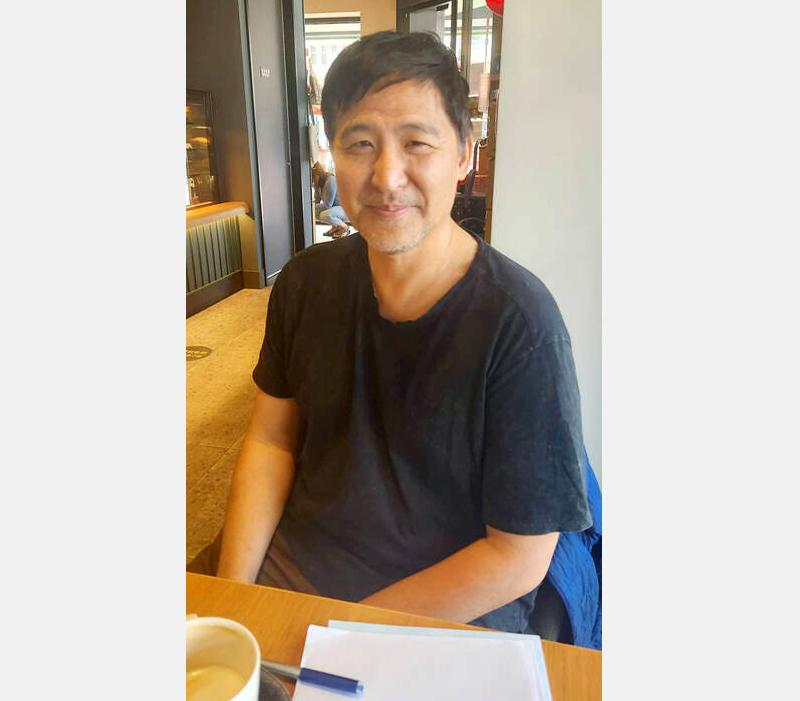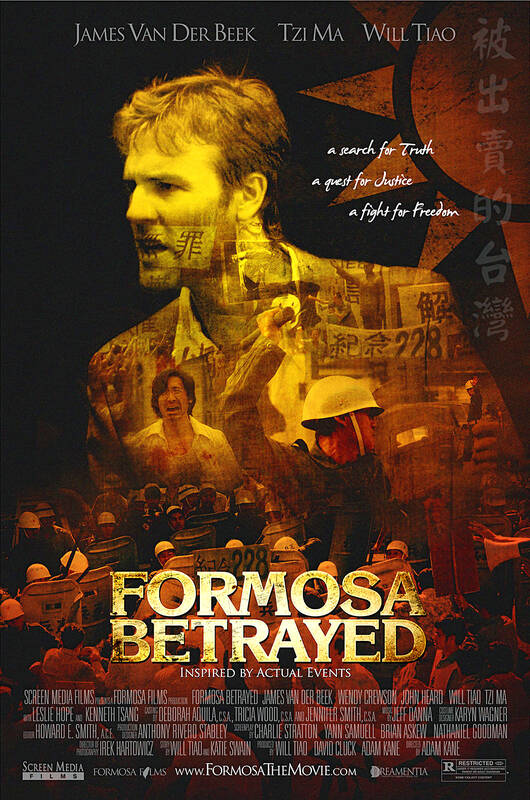Although Taiwanese films such as City of Sadness (悲情城市) and Super Citizen Ko (超級大國民) have been set against a backdrop of the historical period known as the“White Terror” (白色恐怖), the 2009 political thriller Formosa Betrayed remains the only American-made movie to address this period of Taiwanese history head-on. Underpinned by a thrilling narrative involving an FBI investigation into the murder of a Taiwanese professor at a small Midwestern college — inspired by the real-life death of professor Chen Wen-chen (陳文成) and the assassination of journalist Henry Liu (劉宜良) in the US in the early 80s — the movie explores the political persecution that took place in Taiwan under martial law and does so in a way that is visceral, convincing and totally compelling.
I sat down with Will Tiao (刁毓能), the writer, actor and producer behind Formosa Betrayed, to discuss the making of this groundbreaking film, and to hear his reflections, as an American born Taiwanese, on the current state of Taiwan politics and society. It seemed particularly poignant that the interview took place on Feb 28, a public holiday (now named Peace Memorial Day) to commemorate those who lost their lives in a 1947 massacre today known as the 228 Incident.
Tim Greenwood: What inspired you to make Formosa Betrayed?

Photo: Tim Greenwood
Will Tiao: My parents are originally from Kaohsiung, Taiwan. During their time growing up, Taiwan was in the middle of martial law and the White Terror period. My parents were Taiwanese and had always felt very strongly about that. When they moved to the States, where I was born and raised, they always insisted that we call ourselves Taiwanese and not Chinese — and I really didn’t know the difference, because where I was growing up it was more about whether you were Asian or not. As I got older, I learned the story of what was going on in Taiwan at that time and it really affected my understanding of the world. My father was a professor at Kansas State University. Even in the middle of Kansas he was spied upon by students from Taiwan and was blacklisted. He could not come back to Taiwan for many years, and his family was harassed. It was something that affected us deeply. I knew growing up of stories that had gone beyond harassment. I had known about what had happened to professor Chen Wen-Chen, a Taiwanese professor who came back to Taiwan and was found dead on the steps of National Taiwan University. And of course, the story of Henry Liu, murdered in his home, in his garage, by two Chinese gangsters on bikes. Knowing those stories, combining those stories, was the impetus for thinking about Formosa Betrayed and thinking about how to tell Taiwan’s story through that lens to a wider audience.
TG: If you could go back in time and change any aspect of Formosa Betrayed what would that be?
WT: We ended up shooting the Taiwan portion of the movie in Thailand. There are many reasons for that, both financial and political. We felt at that time, and we were given evidence that, it may not have been prudent for us to shoot in Taiwan during that period. It was a politically sensitive story, and no one had done anything like that, at that point. Now it’s different. We didn’t have a big budget and we couldn’t afford for something to go wrong and be able to bounce back from that. So, we found that Thailand is a very friendly place for Western filmmakers, and I would love to see more of that here in Taiwan. I think that there is more of that here now. I would have loved the opportunity to shoot the film here. That would be my only major regret. However, we did have a very good experience in Thailand. From the period aspect of it. But it is a Taiwanese story, and my original intent was to tell it in Taiwan. I feel like there are opportunities now to tell this story and many others in Taiwan for an international audience.

Photo courtesy of Will Tiao
TG: Coming back to Taiwan from the US what are the biggest changes you have noticed?
WT: Over the years I have come back many times. Every time I come back it is more international facing than it was before. I think there’s an awareness of how important that is. From the Martial Law period up to now there have been massive changes, obviously, with democracy and freedom of speech. People are willing to say things that they were never willing to say before. We all know that Taiwan regularly ranks as the freest country in Asia, that the economy is very open. Taiwan has really blossomed. Every time I see it, Taiwan blossoms more. I’m very proud to say that I am Taiwanese-American. To be from a country that really is a model for many developing countries, even for developed countries! To see what can be achieved when people stand up and make their voices heard.
TG: Do you feel hopeful about Taiwan’s future?
WT: I do feel hopeful. Obviously, everyone lives with the fear of what could happen with China threatening to annex Taiwan. There’s always that concern. We watch the situation with Ukraine with a lot of concern. That’s why I think it’s very important that Taiwan continues to have its story told and be seen internationally so that people around the world can get to know Taiwan and to have a stake in what’s happening. People have a stake in Taiwan whether they know it or not because of the critical role that Taiwan plays in the world economy with, for example, the semi-conductor industry. But a lot of stuff about Taiwan is not seen. But it’s there in many of the things we use to run our daily lives. However, people around the world can relate to the stories of the people of Taiwan. I’ll give you one example. I was in Vancouver when Formosa Betrayed had just come out — in the spring of 2010. The film had just played, and I came in to do a Q&A session. A white man in the audience stood up and he said “I’m from Ukraine. This story reminds me so much of what happened in Ukraine.” He likened Stalin to Chiang Kai-Shek (蔣介石). He likened how Russian people forced Ukrainians to people speak their language, just like what happened here in Taiwan. And he said, “There are so many aspects of this story that I can relate to.” I’ve heard this so many times showing the movie. We played the film in Brazil — same situation: Student spies. Right-wing government supported by the United States for anti-Communist reasons. We showed the film in Poland recently. Same thing. This is a very international story. Going back to your original question: I feel like Taiwan has really blossomed and I feel like Taiwan has a lot more to come.
TG: We’re conducting this interview on 228. Is this a poignant time for you to be talking about the film?
WT: Well, 228 is a big theme in the movie. There are a number of touchpoints within the film. I notice over time that I’ll see on social media that some people make it an annual tradition on 228 to watch the film because there aren’t a lot of movies based on this time period and what happened. Our movie and the character I play specifically references the history of 228. And this is the 15th anniversary of the year the film was released. We actually released the movie on the weekend of 228 in the Unites States. I believe that 228 is a seminal moment in Taiwan history when the identity of Taiwan was born. A separate identity apart from the Japanese and the Chinese. And I love that our movie is associated with that.

On April 26, The Lancet published a letter from two doctors at Taichung-based China Medical University Hospital (CMUH) warning that “Taiwan’s Health Care System is on the Brink of Collapse.” The authors said that “Years of policy inaction and mismanagement of resources have led to the National Health Insurance system operating under unsustainable conditions.” The pushback was immediate. Errors in the paper were quickly identified and publicized, to discredit the authors (the hospital apologized). CNA reported that CMUH said the letter described Taiwan in 2021 as having 62 nurses per 10,000 people, when the correct number was 78 nurses per 10,000

As we live longer, our risk of cognitive impairment is increasing. How can we delay the onset of symptoms? Do we have to give up every indulgence or can small changes make a difference? We asked neurologists for tips on how to keep our brains healthy for life. TAKE CARE OF YOUR HEALTH “All of the sensible things that apply to bodily health apply to brain health,” says Suzanne O’Sullivan, a consultant in neurology at the National Hospital for Neurology and Neurosurgery in London, and the author of The Age of Diagnosis. “When you’re 20, you can get away with absolute

May 5 to May 11 What started out as friction between Taiwanese students at Taichung First High School and a Japanese head cook escalated dramatically over the first two weeks of May 1927. It began on April 30 when the cook’s wife knew that lotus starch used in that night’s dinner had rat feces in it, but failed to inform staff until the meal was already prepared. The students believed that her silence was intentional, and filed a complaint. The school’s Japanese administrators sided with the cook’s family, dismissing the students as troublemakers and clamping down on their freedoms — with

As Donald Trump’s executive order in March led to the shuttering of Voice of America (VOA) — the global broadcaster whose roots date back to the fight against Nazi propaganda — he quickly attracted support from figures not used to aligning themselves with any US administration. Trump had ordered the US Agency for Global Media, the federal agency that funds VOA and other groups promoting independent journalism overseas, to be “eliminated to the maximum extent consistent with applicable law.” The decision suddenly halted programming in 49 languages to more than 425 million people. In Moscow, Margarita Simonyan, the hardline editor-in-chief of the